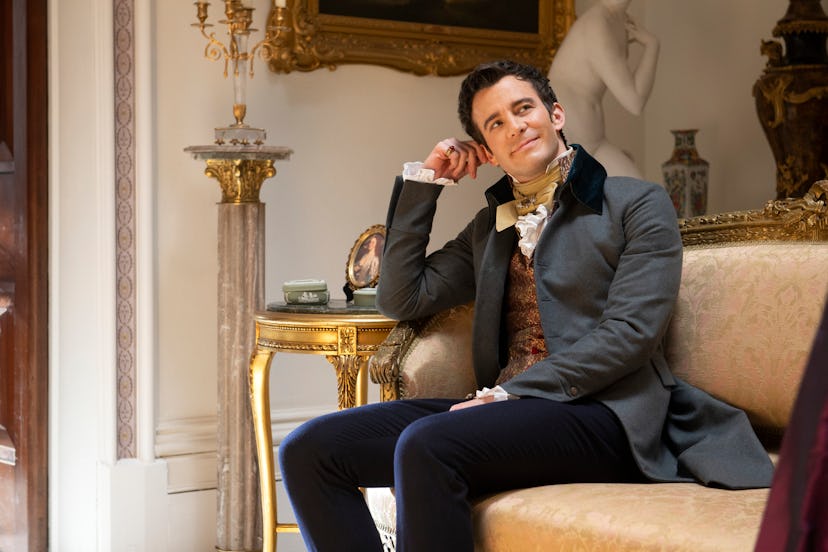Bustle Exclusive
Bridgerton's Luke Thompson Unpacks Benedict's Season Of Discovery
He has one major tip for your next rewatch.

As the second-eldest son with no desire to settle down, Benedict has enjoyed his share of dalliances on Bridgerton. His Season 3 tryst with Lady Tilley Arnold and her companion, Paul, may be the most transformative yet. Spoilers ahead for Bridgerton Season 3 and the novels by Julia Quinn.
The trio exchange intimacies before falling into bed together in the season’s final episodes, where Benedict declares he has “love to give in abundance.” While the scenes could be telling for the character, actor Luke Thompson didn’t feel extra pressure to film them.
“They are really fun to do,” the 35-year-old tells Bustle of the sex scenes. “In my mind, they’re no different than [when] Tilley and I dance. You’re basically using something physical to describe or explore something between two — or in this case, three — people.”
Benedict’s sexuality has long been the subject of fan speculation, and that extends to Thompson, too. “It’s always been part of the writing that Benedict feels slightly curious about his desires, rather than certain in what he wants and is looking for,” says the London-based actor, who earned an Olivier Award nomination for A Little Life.
In the season finale, Tilley tells Benedict she wants a more substantial relationship. “Even merriment can grow tiring,” she warns.
While Benedict seems intent on exploring, his final scene seems to question that resolve. Speaking of his mother’s upcoming masquerade ball, he tells Eloise he’ll be “avoiding eligible ladies like the plague.” He stands in a giant hallway by himself, and he looks lonely for once — and maybe, like Tilley said, a little tired.
Given this moment, his season feels imminent. In the book series, Benedict meets his love interest, Sophie, at this event.
“We just love to keep you guessing,” Thompson teases. “There’s a constant dialogue between the books and the show, and that’s what makes it fun to watch. You don’t quite know what’s going to happen.”
The actor isn’t on social media, so times when he comes face to face with the Bridgerton fandom are “beautiful and surprising” reminders of how many people are tuning in, like a recent appearance on The View with Golda Rosheuvel.
“You have moments where it’s a real wake-up call, where you think — it’s almost trite to say — there’s a real enthusiasm for the show,” he says with a laugh. “Who knew?”
Below, he opens up about Benedict’s sexuality, whether he’ll pick up a paintbrush again, and a detail you may have missed.
I loved seeing Benedict explore this season. How do you think about his sexuality at this point in the show?
He seems to approach his feelings in a spirit of curiosity. There’s very little angst about it. It’s refreshing to see someone tackle that side of themselves without anxiety about who they are and what it means.
Male sexuality, particularly, can feel boxy in the way that it’s explored. Let’s be clear, it was an extremely repressive period. By our modern terms, the closest [descriptor] would be something along the lines of pansexuality — being attracted to the way that someone thinks and feels, regardless of gender. That’s a word that could be used. But what’s refreshing about it, certainly in the way that it’s being discovered at the moment, is that there is a sense of label-lessness about it.
What was your reaction to learning about Francesca's future love interest being Michaela, instead of Michael?
To welcome positive, happy queer love storylines [that aren’t] all about angst or tragedy or things going wrong, it’s a really lovely thing.
Going back to Season 2, Benedict’s confidence was shaken when he learned that Anthony paid for his spot in art school, but we didn’t see too much fallout. Do you have an idea of how Benedict processed that blow?
[With] Benedict, things seem to surface, then go back underneath, and you don’t hear about them for ages. That doesn’t mean they disappear. Art is still part of Benedict’s character. Whether it gets mined again, we’ll have to see. But what’s really well-drawn across the three seasons, this idea of someone trying to define themselves outside of who they are within a family. He does feel like he’s found an escape route, and then suddenly Anthony is there. You can see why that would make him feel like retreating. But, as always with Benedict, he shelves it for a bit.
Where does Benedict stand at the end of Season 3?
The conversation with Tilley is a real confronting moment. Tilley is sort of holding up a mirror to him like, Well, this is all good and fun, but what do you actually want?
He has this great line while talking to Eloise: “It feels right now that the next thing I might learn may change me entirely.” What do you make of that statement?
It speaks to Benedict’s complex relationship with growing up. When you put down a root, or you make a real choice, you mature, and it’s difficult to do that. When you’re young, you just want freedom, freedom, freedom to constantly reinvent yourself and discover more. It doesn’t really work like that. We are finite, and we have to grow up and make choices. That’s something that Benedict clearly wants to do, but is anxious about doing.
Is there anything about Benedict’s story you haven’t talked about publicly yet?
One of the things that’s wonderful about this show is that it’s so breezy, but it’s sort of deceptive. This is me advocating for people to watch it slowly — there’s a lot more than meets the eye.
One of the moments I really like is when, during the dance [in Episode 3], Tilley and Benedict switch positions, Tilley then does the male partner’s steps. Little moments like that are really revealing.
This interview has been edited and condensed for clarity.